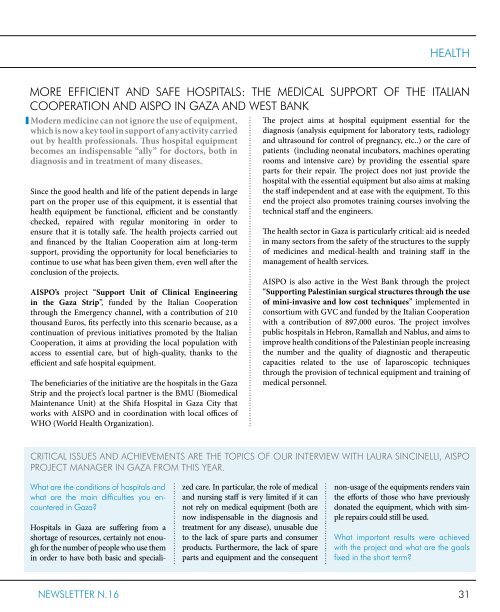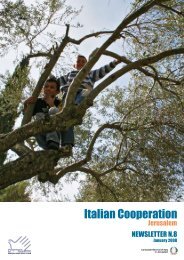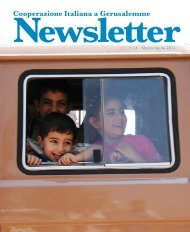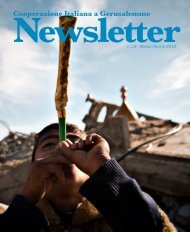newsletter n.16 - Gerusalemme
newsletter n.16 - Gerusalemme
newsletter n.16 - Gerusalemme
You also want an ePaper? Increase the reach of your titles
YUMPU automatically turns print PDFs into web optimized ePapers that Google loves.
HEALTH<br />
More efficient and safe hospitals: the medical support of the Italian<br />
Cooperation and AISPO in Gaza and West Bank<br />
Modern medicine can not ignore the use of equipment,<br />
which is now a key tool in support of any activity carried<br />
out by health professionals. Thus hospital equipment<br />
becomes an indispensable “ally” for doctors, both in<br />
diagnosis and in treatment of many diseases.<br />
Since the good health and life of the patient depends in large<br />
part on the proper use of this equipment, it is essential that<br />
health equipment be functional, efficient and be constantly<br />
checked, repaired with regular monitoring in order to<br />
ensure that it is totally safe. The health projects carried out<br />
and financed by the Italian Cooperation aim at long-term<br />
support, providing the opportunity for local beneficiaries to<br />
continue to use what has been given them, even well after the<br />
conclusion of the projects.<br />
AISPO’s project “Support Unit of Clinical Engineering<br />
in the Gaza Strip”, funded by the Italian Cooperation<br />
through the Emergency channel, with a contribution of 210<br />
thousand Euros, fits perfectly into this scenario because, as a<br />
continuation of previous initiatives promoted by the Italian<br />
Cooperation, it aims at providing the local population with<br />
access to essential care, but of high-quality, thanks to the<br />
efficient and safe hospital equipment.<br />
The beneficiaries of the initiative are the hospitals in the Gaza<br />
Strip and the project’s local partner is the BMU (Biomedical<br />
Maintenance Unit) at the Shifa Hospital in Gaza City that<br />
works with AISPO and in coordination with local offices of<br />
WHO (World Health Organization).<br />
The project aims at hospital equipment essential for the<br />
diagnosis (analysis equipment for laboratory tests, radiology<br />
and ultrasound for control of pregnancy, etc..) or the care of<br />
patients (including neonatal incubators, machines operating<br />
rooms and intensive care) by providing the essential spare<br />
parts for their repair. The project does not just provide the<br />
hospital with the essential equipment but also aims at making<br />
the staff independent and at ease with the equipment. To this<br />
end the project also promotes training courses involving the<br />
technical staff and the engineers.<br />
The health sector in Gaza is particularly critical: aid is needed<br />
in many sectors from the safety of the structures to the supply<br />
of medicines and medical-health and training staff in the<br />
management of health services.<br />
AISPO is also active in the West Bank through the project<br />
“Supporting Palestinian surgical structures through the use<br />
of mini-invasive and low cost techniques” implemented in<br />
consortium with GVC and funded by the Italian Cooperation<br />
with a contribution of 897,000 euros. The project involves<br />
public hospitals in Hebron, Ramallah and Nablus, and aims to<br />
improve health conditions of the Palestinian people increasing<br />
the number and the quality of diagnostic and therapeutic<br />
capacities related to the use of laparoscopic techniques<br />
through the provision of technical equipment and training of<br />
medical personnel.<br />
Critical issues and achievements are the topics of our interview with Laura Sincinelli, AISPO<br />
project manager in Gaza from this year.<br />
What are the conditions of hospitals and<br />
what are the main difficulties you encountered<br />
in Gaza<br />
Hospitals in Gaza are suffering from a<br />
shortage of resources, certainly not enough<br />
for the number of people who use them<br />
in order to have both basic and specialized<br />
care. In particular, the role of medical<br />
and nursing staff is very limited if it can<br />
not rely on medical equipment (both are<br />
now indispensable in the diagnosis and<br />
treatment for any disease), unusable due<br />
to the lack of spare parts and consumer<br />
products. Furthermore, the lack of spare<br />
parts and equipment and the consequent<br />
non-usage of the equipments renders vain<br />
the efforts of those who have previously<br />
donated the equipment, which with simple<br />
repairs could still be used.<br />
What important results were achieved<br />
with the project and what are the goals<br />
fixed in the short term<br />
NEWSLETTER N.16 31






